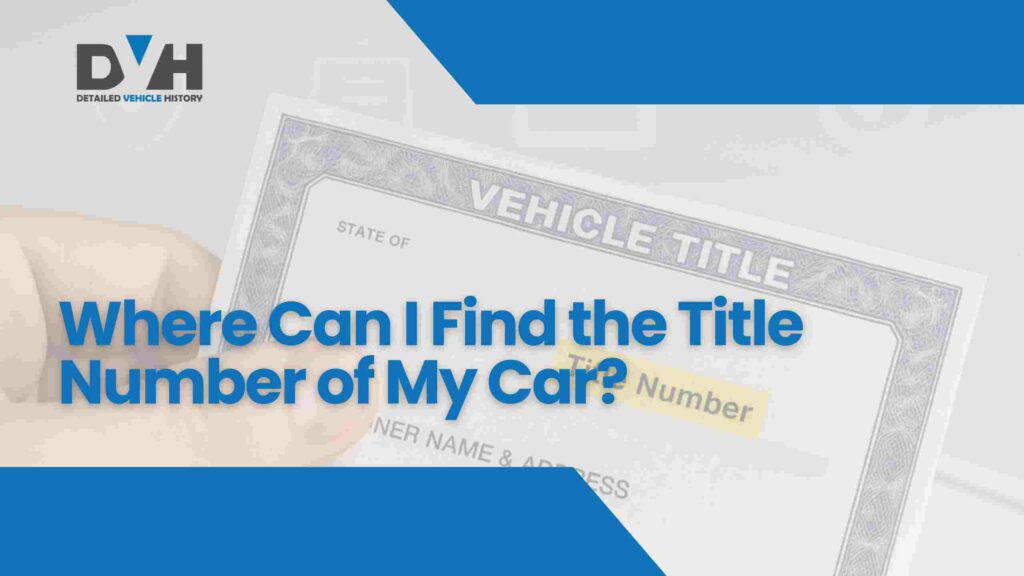Key takeaways:
- Different titles mean different histories. Labels like salvage, rebuilt, or lemon tell you if a car was damaged, repaired, or had serious issues in the past.
- To check the car’s title, you can check the physical title document, registration card, renewal slip, and a vehicle history report.
- The title number is used to identify the vehicle’s owner, whereas the VIN is used to identify the vehicle.
You can find your car’s title number on the title itself, registration cards, renewal slip, and by contacting the state’s Department of Motor Vehicles, or through an online tool like the Detailed Vehicle History to check the car’s title.
Make sure you know where to find your car’s title number, just in case any emergencies happen.
What Does a Title Number Mean?
A car title number is a unique identifier used to identify a vehicle’s certificate of title. It is also known as the vehicle title number. The title number usually consists of 7 to 8 digits, depending on each state’s DMV rules.
You’ll obtain the title number by the time you purchase a car, and it’s needed when you are applying for a new title or trying to find a lost one. If you sell or transfer ownership of the car, the title number will change to a new one under the new owner’s name.
While the title number serves to identify the vehicle’s certification, it’s often confused with the VIN (Vehicle Identification Number). The VIN is used to register and identify the car, and it remains the same no matter how many owners the vehicle has had. In contrast, the title number changes when ownership is transferred.
Why Title Numbers Are Important?
The title number plays a key role in confirming a car’s ownership and history. It’s part of a national system called the National Motor Vehicle Title Information System (NMVTIS), created under the Anti-Car Theft Improvements Act of 1996. This system connects all state DMVs, allowing them to share data and verify vehicle titles across the country.
Because of NMVTIS, it’s easier to catch title fraud and title washing, which is when someone tries to hide a car’s past accident or salvage status.
A title number also shows whether a car’s title is clean or branded:
- Clean title: The vehicle has not had major damage or total loss.
- Branded title: The car has been marked as salvage, rebuilt, junk, or lemon, meaning it has had serious problems in the past.
Where to Find the Title Number
Finding the car’s title number is easy; it is usually found on the vehicle’s paperwork, like the vehicle’s registration and renewal document, local DMV, and obviously the car’s title certification.
On the Vehicle Title Document
The title number is always written on the physical certificate of title. In most of the title certifications, the title number can be found on the section above the Vehicle Identification Number. However, keep in mind that some states use different formats, so the title number might be located elsewhere on the document.
On the Vehicle Registration
If you haven’t gotten the certification of title, you can check your car’s title number on the vehicle registration document. Look for a section that details the car’s make and model; some states may list the title number on the registration form.
Because the vehicle registration documentation is important, it is recommended to put the document in the car; for a faster way, just in case you need to check the car’s title number on the road.
Insurance Paperwork or Documents
Most insurance companies typically only require your car’s VIN. However, some may also ask for your car title number.
If that’s the case, you can contact your insurance provider and request your title number. Be prepared to verify your identity when making the request.
Local Department of Motor Vehicles
If you don’t have either the certificate of title or registration, visit your local DMV office. Make sure to contact the DMV office that issued your documents and bring the necessary identification, such as your ID, the vehicle’s VIN, and proof of ownership, like a bill of sale. They can provide you with a copy of your car’s title number.
Protip: You can ask the DMV to get you an extra copy of the title for a fee. This way, even if you lose your original documents, you’ll be able to get a replacement title.
The Uses of a Title Number
A vehicle’s title number serves several important purposes:
1. Proof of Ownership
The title number confirms that the person listed on the title is the legal owner. It’s used when transferring ownership to ensure that the sale is valid and properly recorded.
2. Fraud Prevention
Checking a car’s title number helps prevent fraud. By matching the title number and VIN in DMV or NMVTIS databases, buyers can confirm that the title is real and hasn’t been tampered with.
3. Vehicle Registration
The title number is needed when registering or renewing your vehicle. It helps DMVs maintain accurate ownership records and track lien releases.
When You Might Need the Title Number
Knowing your title number is useful in several situations, such as:
- Selling or Transferring Ownership: The DMV will ask for the title number when you sell your car or transfer ownership to someone else.
- Replacing a Lost Title: If your title is lost or damaged, you’ll need the title number to request a duplicate.
- Registering a Car in a New State: Some states require the title number when re-registering an out-of-state vehicle.
- Insurance and Loan Applications: Certain lenders or insurers may request the title number to verify legal ownership.
State Variations and Titling Challenges
Each state has its own rules for titling. Some older vehicles may not require a title, while others may have different rules for reporting liens or branded titles. These variations can confuse interstate car sales.
That’s why it’s always smart to check the state DMV website before buying or selling a vehicle, especially across state lines.
How to Verify a Title Number
To confirm a car’s title is valid, you can use several reliable resources:
1. National Motor Vehicle Title Information System (NMVTIS)
This is the most trusted database in the U.S. It shows title records, past registrations, and whether a car has been marked as salvage or total loss.
2. State DMV Services
Many states, like California, Texas, and New York, let you check title status online. You can verify if a vehicle has an active lien or a clean title before you buy.
3. Third-Party Providers
NMVTIS-approved companies, such as Detailed Vehicle History. We provide detailed vehicle history reports that include title information and title brand, but we do not show the title number.
Types of Title Problems
Several issues can appear with a vehicle’s title. These include missing signatures, problems with liens, or differences between the title and the car’s history. For example, cars bought with financing often list a lienholder on the title. Buyers should always check that any liens are fully settled and that the title is clear before completing a purchase.
Rebuilt and Salvage Titles
Cars with rebuilt or salvage titles can be more complicated to buy. A rebuilt title means the car was once declared a total loss but has since been repaired and passed inspections. Even though these cars may be safe to drive, their history of serious damage can lower their resale value and affect reliability.
It’s important to carefully review repair records and have the vehicle inspected before buying. Always use the salvage VIN check to examine if the vehicle carries a salvage title.
Title Fraud and Counterfeit Titles
Title fraud is a serious risk when buying a used car. This can happen if a fake title is created or if a duplicate title is made to sell a stolen vehicle or one with unresolved liens. To avoid fraud, check that the title is properly formatted, the VIN matches the vehicle, and the information agrees with vehicle history reports. Also, confirm that any liens have been released to prevent problems later.
Lemon Title
A lemon title indicates a car that has serious problems that cannot be fixed even after multiple repair attempts. In some cases, manufacturers or states may issue a “lemon law” title to identify these vehicles. Buying a lemon can be risky because it may have hidden defects, costly repairs, or unresolved warranty issues.
Errors in Public Records
Even small clerical or filing mistakes in deeds, surveys, or other legal documents can lead to major confusion about property ownership. These errors might include misspelt names, incorrect property descriptions, or missing information. While they may seem minor, they can delay transactions or complicate future ownership transfers.
Fraud and Forgery
Fraudulent activity, such as forged signatures on a deed or impersonating the true owner, can result in illegal property transfers. These acts not only put ownership at risk but can also cause financial loss and lengthy legal disputes. Regular title checks and proper documentation help reduce the chances of falling victim to such issues.
How does the Title Number Connect to Salvage, Rebuilt, and Lemon Titles?
The title number doesn’t directly show if a car has a salvage, rebuilt, or lemon title, but it is connected to the record that includes this information. Here’s how it works:
- Linked Record: The title number is tied to the DMV’s record of the vehicle, which includes its title status and history.
- New Number for Each Change: When the title changes, for example, if the car becomes salvage, rebuilt, or lemon, the DMV issues a new title with a new title number.
- Helps Track Ownership and Condition: This system makes it easier to track any major changes in the vehicle’s condition or ownership.
- Check by VIN: When you run a title or VIN check, you can see the latest title number and its status.
- Red Flag for Mismatch: If the title number doesn’t match the most recent DMV record, it could mean the title is outdated or even fake.
Always make sure to confirm both the VIN and the title number before buying a used vehicle to avoid problems later.
Is a Car Title a Physical Document?
Yes, a car title is a physical document. However, many states now offer an electronic title, known as e-title, for easier access and a transfer process. A car title usually details important information about the vehicle, like the year, make, model, VIN, title number, owner identification, lien holder (if any), odometer reading, and other information.
What Does a Car Title Look Like?
A car title is proof of ownership in the form of a legal document. The visual appearance of a car title might be different in each state because they has their own template. Furthermore, the car title must include this information to legitimate the claim.
- Vehicle Identification Number (VIN): A unique 17-character code that identifies the vehicle.
- Title Number: A distinct number assigned to the title for tracking and ownership purposes.
- Owner’s Information: The name and address of the vehicle’s registered owner. If the car is financed, the lender’s name may also be listed.
- Make, Model, and Year: The vehicle’s make, model, and year of manufacture.
- Odometer Reading: Some titles include the mileage reading at the time the title was issued.
- Lienholder Information: If there is an outstanding loan on the vehicle, the title will include the name of the lender.
- Date of Issue: The date when the title was created or transferred to the current owner.
- Official Seals and Watermarks: Titles often feature official government seals or watermarks to prevent fraud.
- Signatures: The seller’s signature (if transferring ownership) and sometimes the buyer’s signature.
Is the Title Number the Same as the VIN?
The title number and the Vehicle Identification Number (VIN) are not the same. They serve distinct purposes.
The title number, usually 7 to 8 characters long, is used to identify the owner of the vehicle and does not necessarily show the vehicle’s specifications. Furthermore, the title number will change once the car’s ownership has been transferred to the other person.
In contrast, the Vehicle Identification Number is used to identify the vehicle, not the owner. The VIN is written in a 17-digit code that consists of numbers and letters that detail each component on the vehicle, such as the engine number and the assembly plant location.
Unlike the title number, the VIN remains unchanged, even if the vehicle changes ownership multiple times. Run a VIN check to get the detailed information of the vehicle, including the specifications and history, like accident and auction records.
Common Mistakes to Avoid with Title Numbers
Even though the title number seems simple, small errors can cause legal or ownership issues. Avoid these common mistakes:
- Forgetting to Update Ownership: Always make sure the title number is updated after selling or buying a car.
- Not Checking for Liens: A car might still have a lien even if the title looks clean. Always confirm with a VIN or title check.
- Ignoring State Differences: Each state’s DMV formats and rules can differ. Check your local DMV for the correct process.
- Losing the Physical Title: Keep the original document safe, even though digital titles exist; some transactions still require the physical copy.
Why Title Verification Matters?
Verifying a title number before buying a used car can save you from major problems. It helps you avoid buying a stolen vehicle, a car with hidden liens, or one with a washed title.
Using official databases like NMVTIS or a trusted VIN check service like the Detailed gives you peace of mind that the vehicle’s paperwork is legitimate
Legal Framework and State Differences
Title numbers and rules are controlled by both federal and state laws. While NMVTIS sets the main standards, each state still has its own policies for issuing, transferring, or verifying titles.
Some states are very strict with branded titles, while others make it easier to register vehicles that were previously written off. Because of these differences, buyers should always check the title carefully, especially when buying a car from another state.
Conclusion: Importance of the Title Number
Finding a car’s title number is easy; you just need to look at the certification title or on the vehicle’s paperwork, like on the registration paper. Make sure you have the title document with you most of the time, just in case there’s an emergency on the road that requires you to prove the ownership of the vehicle.
Or, if you cannot find the title in these documents, you can use the title check by VIN and get the detailed information about the vehicle’s title.
FAQs on Where to Find the Car’s Title Number
What does a normal car title look like?
A standard car title is typically printed on white paper and contains key details such as the owner’s name, the date of issue, the odometer reading, and other state-specific information. While the design may vary by state, it generally includes all the necessary information to verify ownership and the vehicle’s legal status.
How can you tell the difference between a real title and a fake title?
Authentic car titles are printed on high-quality, watermarked paper with clear, sharp text. In contrast, fake titles often feel different, with faded colours, blurred text, or thinner paper that doesn’t match official documents. Always check for any inconsistencies or errors in the information to ensure its legitimacy.
Who holds the title to my car?
The legal owner of your vehicle is listed on the car title, along with the VIN and any lienholders. If you have an outstanding loan, your lender will typically hold the title until the loan is fully paid off. Once you’ve completed payments, the title will be transferred to you.
Where is a car title usually kept?
It’s important to keep your car title in a safe and secure place, such as a home safe or safety deposit box. This ensures it’s protected from loss, theft, or damage.
What makes a car title invalid?
A car title can become invalid in several ways, such as:
- Failure to transfer the title: If the title was signed but never officially transferred to the new owner.
- Incorrect sale date: When the date of sale on the title doesn’t match the actual transaction date.
- Wrong odometer reading: If the odometer reading is incorrect or doesn’t match the car’s mileage at the time of sale.
- Misspelt names: If the buyer’s or seller’s name is misspelt, it can cause issues with the title’s validity.









